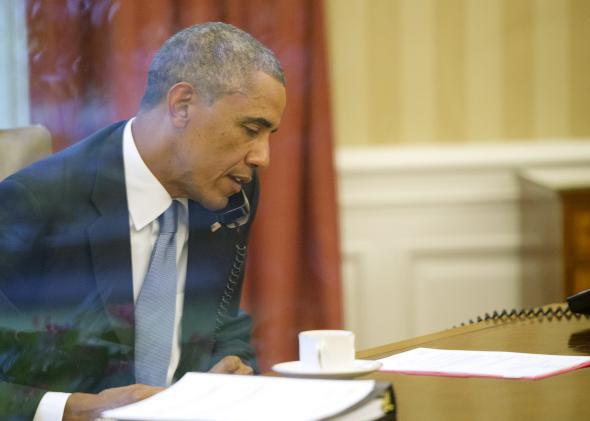After three years of reluctance, President Obama now appears likely to push for direct U.S. military intervention in Syria. He will lay out his strategy for defeating ISIS in a televised address to the nation tonight, and according to senior officials, he is prepared to authorize airstrikes targeting the group within Syrian territory.
This development seemed inevitable as soon as the president shifted to talking about destroying or permanently degrading ISIS. But as the president gets set to make his case to the public and a jittery Capitol Hill, events are moving quickly in Syria, and shifting in such a way that Obama may have already suffered a major blow on the eve of his announcement.
The administration’s reluctance to get involved in the conflict is understandable, but by waiting as long as it did, it may have made the task of helping the groups on the ground far more difficult. In short, if Syrian rebel groups collapse—as it appears might be happening—the U.S. will be, whether it admits it or not, choosing the lesser of two very extreme evils, tacitly supporting Bashar al-Assad in defeating ISIS and regaining control of his country.
While the Syrian civil war may once have been viewed as a fight between Assad’s regime and “the rebels,” it’s now much more complicated than that. The major groups now fighting for territory and political influence within Syria include (but are not necessarily limited to): the government; ISIS; the Western-supported Free Syrian Army; the al-Qaida-affiliated Jabhat al-Nusra; the Kurdish PYD, which has gained control of significant territory in areas near the Turkish border; and the Islamic Front, an umbrella group of Islamist groups distinct from both the “moderate” rebels of the FSA and the hardline jihadists in ISIS and Nusra.
The last group on that list has gotten relatively little attention, but recent events show it could be critical. A bombing in northern Syria decimated the leadership of Ahrar al-Sham, a long-established and well-organized rebel group that was one of the primary organizers of the Islamic Front alliance.
As the Carnegie Endowment’s Aron Lund puts it, the group served as a “missing link between radical Salafi-jihadism and the type of mainstream and Syrian nationalism-infused Islamists that Western and Gulf state powers preferred to work with—a powerful ‘swing voter’ in the struggle over the ideological direction of Syria’s insurgency.”
It’s not yet clear who carried out the attack, but the hardline Islamist Ahrar al-Sham had been increasingly cooperating with more moderate groups in the fight against ISIS. The explosion killed a dozen of the group’s top leaders, and it’s possible it will now simply cease to exist, leaving its members up for grabs for other groups. This could mean that Islamist groups and the internationally supported “moderate” rebels will increase their cooperation to counter ISIS and Nusra, or that these “swing voters” may just disperse to both sides.
Lund notes that the group has been playing a prominent and highly visible role in the defense of Aleppo, Syria’s largest city and the non-ISIS rebels’ last major urban stronghold. The remaining rebels in Aleppo are under pressure from both government forces and ISIS, with devastating effects for the civilian population.
“As Aleppo goes, so goes Syria’s rebellion,” argues a recent analysis from the International Crisis Group. “The city is crucial to the mainstream opposition’s military viability as well as its morale, thus to halting the advance of the Islamic State.”
The analysis suggests that an ideal development would be a cease-fire between the government and rebels in order to roll back ISIS. But as that seems impossible, “the only realistic alternative is for the opposition’s state backers to improve support, qualitatively and quantitatively, to credible non-jihadi rebel groups with roots in Aleppo.”
There are some indications that with recently provided weaponry from the outside, the Free Syrian Army and some allied Islamist groups have launched offensives against ISIS in the area. But it seems pretty unlikely that they can continue to fight a two-front war without a significant increase in international support.
U.S. priorities in Syria have clearly shifted from aiding the rebels fighting Assad to containing the growth of a dangerous new threat in ISIS. But a robust rebel movement is still necessary both as an ally against ISIS and for the administration to make the moral and political case for intervention. The “rebels” these days, though, are a fractious and fluid grouping that includes some groups, like Ahrar al-Sham, that U.S. policymakers would usually find pretty unpalatable. The political case for intervention may be building, but practically, it’s only getting more complicated.
